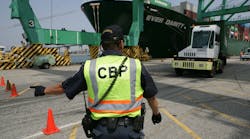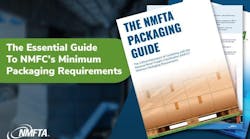While collisions remain the number one risk in the transportation industry in terms of insurance claims, it’s actually been on the decline for several years now in the face of vastly improved vehicle safety technology, driver training, stricter regulatory codes, and other factors, according to research conducted by the Travelers insurance company.
By contrast, the risk posed by cargo theft growing significantly, especially as many transportation providers are attempting to diversify into new markets and haul cargoes unfamiliar to their operational profiles as they attempt gain new sources of revenue and profits.
“Cargo theft exposure has increased and will continue to do so,” Sam Rizzitelli, national transportation director for Travelers’ Inland Marine division, told Fleet Owner.
“By contrast, collision risk – while still the most common risk to transportation operations – is starting to taper off in terms of loss exposure,” he added. “That’s a trend due improved vehicle technology, better risk management practices, the new CSA [Compliance Safety Accountability] program, and improved communication with drivers concerning the importance of highway safety.”
That’s been bourne out to a degree by truck-car crash statistics compiled by the National Highway Traffic Safety Administration (NHTSA). While truck-car collisions did increase between 2009 and 2010, they’d been in significant decline over the past decade, according to the Federal Motor Carrier Safety Administration (FMCSA).
However, cargo theft is now on the upswing, Rizzitelli noted – up 9% in 2011 from 2010, according to FreightWatch International. “There’s a lot more theft happening because it’s profitable,” he explained. “It’s also a kind of risk exposure that many carriers and shippers erroneously feel is difficult to defend against; many feel helpless in some ways against it, but that doesn’t have to be the case.”
That’s partly because a large number of carriers and shippers alike are getting into new markets with risks they’ve never had to deal with, Rizzitelli said – especially when it comes to cargo theft.
“Volatility in the economy due the ‘Great Recession’ caused many to vary the use of their fleets in an effort to be resourceful and increase shipping activity,” he pointed out. “Thus they may end up hauling cargo they are unfamiliar with and a lack of prior experience with a cargo commodity may increase risk, as well as creating a scenario that exposures are not properly insured.”
That “unfamiliarity” is also why cargo damage risk exposure is rising as well, Rizzitelli said. “Certain products are more susceptible to water and fire and it is not always apparent when these exposures are a threat,” he noted. “For example, when carriers transport cargo on unfamiliar routes, they may face exposures from seasonal weather or climate change. Thus it’s important that they are aware of how to effectively protect cargo from spoilage or damage.”
Those are but some of the reasons why Rizzitelli believes the relationship between insurance carriers and the transportation industry is fundamentally changing – with insurance companies becoming more like “business partners” with transportation firms, providing expertise, consulting, and even investigative services along with insurance coverage.
“There’s a very real change in our relationship going on, especially in terms of our work combating cargo theft through our Special Investigation Group (SIG),” he explained. “The difficult economy wrought changes to operations in the transportation arena, including the addition of challenges posed by hauling new different commodities. That means their risk exposures must be re-addressed as well.”



